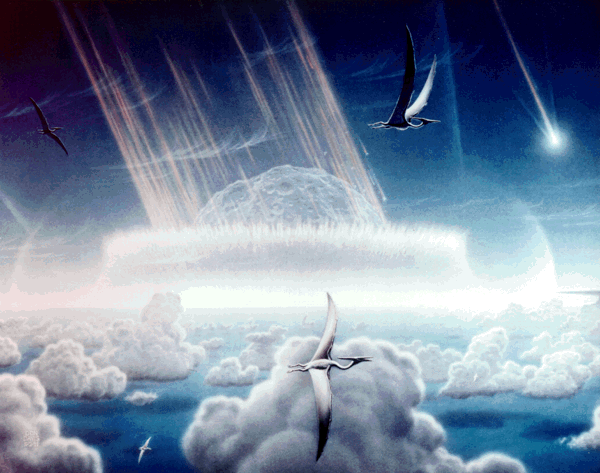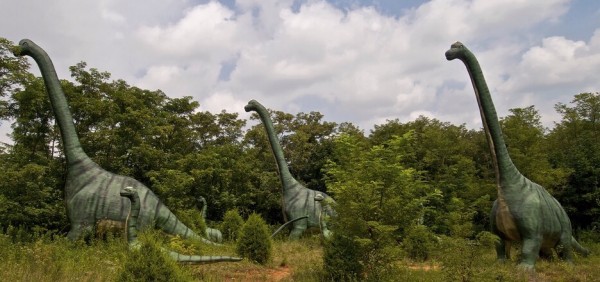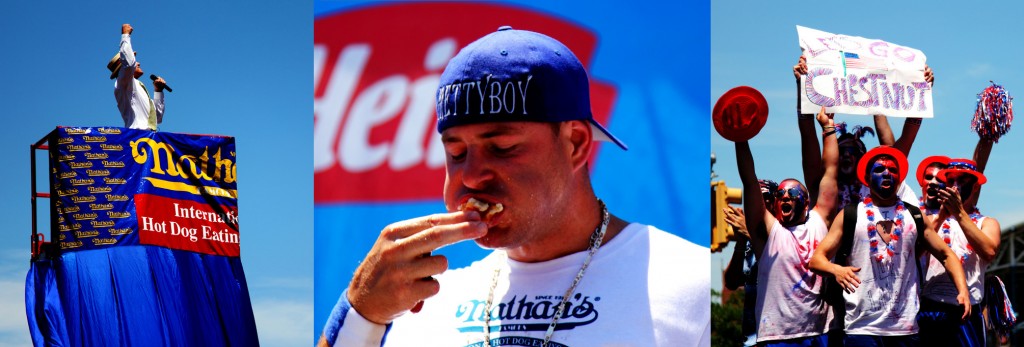Once upon a time, about a billion years ago, life was simple. Everybody lived in the oceans, and everybody had only one cell each. This was quite a fair and egalitarian way to live. Nobody really had significantly more resources than anyone else. Every individual just floated around, and took whatever it needed and could find, and just let the rest be.
This golden equilibrium was how life did business for a couple billion years. There was no such thing as jealousy or envy, and as a result, everyone lived pretty happy lives.
Then, one day about 800 million years ago, a pair of single-celled organisms merged to become the first multi-cellular organism in the history of the earth.
At first, these multi-celled creatures were just kind of like big blobs of single-celled organisms, and didn’t cause a lot of problems. Everybody was still kind of doing the same job as everyone else, even if they had organized themselves into a limited corporation of sorts. Most other single-celled creatures just figured they were harmless weirdos hanging out together, and ignored them.
They could not have been more wrong. For once the multi-cell genie was out of the bottle, Pandora’s box could not be closed, and the dominos began to fall. This simple change may have seemed innocent at first, but little did the single-cells know that they were the first creatures on earth to fall victim to the innovator’s dilemma. The single-celled creatures were far too invested in the status quo to change, and consequently ignored the multi-cellulars as irrelevant, and did not realize until it was too late that the game had suddenly shifted.
The point where it became too late was somewhere around 600 million years ago, when one of these corporations invented a kind of division of labor. No longer would everybody in a corporation do the same job as everyone else. Some cells would specialize, and only do one kind of job, and leave the other jobs for other cells. An eye would be an eye and not a heart. A mouth would be a mouth and not a stomach.
Thus ended earth’s egalitarian paradise. Suddenly, not only did some living beings begin to have a lot more cells than other living beings, but they were divided into classes, and forced into repetitive labor on behalf of larger corporate entities.
Wealth inequality soon became a huge problem, as these large corporate entities with large labor forces evolved to become more and more efficient at exploiting the poor single-celled creatures. Over time, the corporations grew bigger and bigger and bigger, while pushing out the single-cells as the dominant kind of life form on the planet.
When their failures began to hit them, the single-celled creatures began to learn to both avoid and attack these evil corporations. But necessity is the mother of invention, and the avoidance actually ended up making things worse. For such is the genius of competition, that once the single-cells began to adjust, the multi-cells adjusted to their adjustment.
One of these specialty cells invented a way to arbitrage the difference in concentrations of sodium and potassium ions between the inside and outside its cell membranes. These differences in ion concentrations created electrical fields, which could be used to send an electrical current to transmit information from one side of a corporation to another.
When that happened, boy oh boy, I tell you, egalitarianism was really screwed. Before, a single-cell would only be exploited if it happened to have the bad luck of floating by an existing multi-cell. The neuron, as we now call this kind of specialization cell, changed all that.
The neuron triggered a series of further inventions, including the now industry-standard best practice of collecting these neurons into a sort of corporate intranet, also known as a “brain”. Brains enabled these multi-cellular corporations to go beyond the resources that just happened to wander into their immediate environment. Now the multi-cells could now actually pursue and chase down the single-celled creatures in order to ruthlessly exploit their resources.
Just as the steam engine would later trigger the industrial revolution and the web would trigger the dot-com boom, the neuron was the first electric invention to trigger a new era of innovation. This first innovative boom was called the Cambrian Explosion. It began about 542 million years ago, and it was characterized by a very creative period of experimentation in the kinds of things that corporations can do with these new neural technologies. Out of this period of experimentation emerged a very successful product category called vertebrates.
Vertebrates had a bony spine to protect the neural pathways, plus a hard skull to protect the neural hub (that is, the brain). This is an impressive level of security that frankly our current industrial boom, built on a vulnerable stack of TCP/IP and HTTP, sadly lacks. Vertebratism was such a successful design that it dominated all evolutionary development for the next 500 million years. Not even a black swan event such as an asteroid crashing into Earth 67 million years ago could stop its dominance. When the dinosaurs were killed, another vertebrate, the mammals, took over.
 Image credit: NASA
Image credit: NASAThe vertebrate lifestyle, with its ruthless and brutal survival-of-the-fittest competitions, has become so engrained into our culture over the past 500 million years that we have all but forgotten the egalitarian utopia that once graced our earth for over two billion years. Ultimately, we all descended from that single-celled nirvana, and I think that deep down in our hearts (an unfortunate multi-cellular metaphor, but bear with me), a little bit of yearning for that simpler time still lives inside of us.
But until we invent a time machine, we cannot change the damage that has been done by multi-cellular life to the culture of the planet. We are, for better or worse, living in a vertebrocracy, so we better deal with it as best we can.
It is in the nature of vertebrocracies to favor the strong, and punish the meek. It doesn’t matter who the meek are. Once vertebrates had taken over control of the planet from the smaller, single-celled opponents, they then turned their aim on each other. For competition is a natural by-product of sexual reproduction. It is in the DNA of each multi-cellular corporation to compete to acquire the resources needed to survive, grow, and win the battle to reproduce over the other corporations in its environment.
For if you don’t, your genes do not survive to the next generation. In a vertebrocracy, winning is the only thing that matters. The rich get richer. The big get bigger.
It is also often in the nature of vertebrorcracies to be hierarchical. The hierarchy is driven by competition. In any competition, someone will be the best. The winners of these competitions will often be the ones who get to reproduce the most.
To drive this competition, vertebrate “brains” over the past 500 million years have evolved sophisticated neural network topologies that evince “feelings” inside these corporate entities. To encourage the acquisition of food, these neural nets produce a feeling of “hunger”. To encourage the acquisition of water, a feeling of “thirst” is generated. To encourage reproduction, brains output the sensations of “attraction”, “desire” and “orgasms”. To avoid danger, there is “fear”. To encourage physical fighting, there is “anger”. And so on.
The result of all these “feelings” in each vertical corporate market (sometimes called a herd) is a hierarchical structure, where a few corporate entities become the “alphas”, and others fall somewhere in a “pecking order” below the alphas. There are “feelings” that vertebrates have to facilitate these hierarchies. There are feelings of annoyance when someone tries to behave above their hierarchical rank, or does not seem to deserve the rank they have. There are feelings of humiliation when forced into a rank lower than they think they should have. There is hatred for those who impose these improper ranks on others.
Yet the interesting thing to note here is that for all the sophistication of all these neural networks, for all the hierarchical behavior driven by feelings, for 500 million years, until homo sapiens came along, there was no species of vertebrate that rediscovered the initial invention that drove multi-cellular life towards its domination: the invention of a division of labor (beyond just the functions of gender) within the vertebrocracy.
Every stegosaurus had the same job as every other stegosaurus. Every wooly mammoth had the same job as every other wooly mammoth. Every frog has the same job as every other frog. Every penguin has the same job as every other penguin. Every marmoset has the same job as every other marmoset. Every three-toed sloth has the same job as every other three-toed sloth. Every elephant has the same job as every other elephant. Every possum has the same job as every other possum: the job of trying, as an individual entity, to reach the top of the hierarchy and reproduce as much as possible.
Humans, however, are different. Humans can compete as groups.
Just as the invention of neurons enabled communication from one side of a multi-cellular organism to another, thus enabling divisions of labor amongst groups of cells, the invention of language enabled humans to communicate from one side of a human community to another, similarly enabling divisions of labor amongst groups of organisms.
Once humans acquired language, it was not strictly necessary for humans to do the same job as every other human. You could have some humans be hunters and others gatherers, some could be priests and others doctors, some could be clothesmakers and others homebuilders.
To facilitate this division of labor and group competition, evolution did what it always does when it wants to encourage or discourage behaviors in vertebrates: endow the neural networks in these brains with feelings.
Every vertebrate species feels hunger and thirst and fear and anger. But humans experience a whole new set of emotions involved with group cooperation. Loyalty. Betrayal. Belonging. Loneliness. Embarrassment. Forgiveness. Shame. Remorse. Gratitude. Sympathy. Rejection. Acceptance. These are emotions that go beyond the mere selfish feelings of winning or losing as an individual in a hierarchical competition. These are feelings that arise from belonging (or not) to a group of other human beings, and winning (or not) with those groups.
In possession of this most disruptive set of innovations, human beings got better and better at competing as groups for resources. And just as the innovation of the neuron quickly flipped over a 2-billion-year-old equilibrium on the planet resulting in the Cambrian explosion, the invention of language toppled over a 500-million-old equilibrium in just a few tens of thousands of years. Because of language, and the division of labor which language enabled, the planet earth is now dominated by one species: homo sapiens.
Earth is now long removed from the gentle days when single-celled creatures gently floated through the oceans. It is dominated by a species that has been optimized to ruthlessly win both individual competitions within a hierachy, and to win group competitions against other groups of organisms.
Look at what this competitive nature brings out in human beings. Violence. Abuse. A vicious dictator who kills anyone who gets in the way of his obtaining power for himself. Forced labor. Torture. Rape. Environmental destruction. Slavery. One nation invading another nation for some perceived slight, and millions are killed as a result. Racism. Sexism. Human trafficking. Genocide. The suffering that human beings inflict on others, both inside and outside of their own species, is unlike anything any other species has done in the four billion year history of the earth.
If there is one saving grace in this ferocious species, it is that it is still young. The few hundred thousand years that humans have roamed the earth are nothing on an evolutionary timescale. It has not yet had time to optimize its group competitiveness. In the World Wars of the 20th Century, only 15 to 20 percent of soldiers would actually fire their weapons at an enemy. The others simply couldn’t bring themselves to do it.
Imagine what humans would be like if they had not 200,000 years of selective pressure towards group competitiveness, but 200,000,000 years! With that much evolutionary time to work out the bugs, perhaps no human will hesitate to do anything it takes to defeat the competition. Perhaps instead of a 15-20% rate of group competitive efficiency, we will have 95-100% efficiency.
Is that what we want? Do we want, in the end, to be the most amazingly efficient form of competitive entities the universe has ever seen? Do we want to fulfill our evolutionary destiny?
What stops those 80-85% of soldiers from firing at the enemy? Ironically, it is some of the very emotions that brings us together into groups in the first place. Shame. Remorse. Sympathy. Emotions that connect us to other human beings. Eliminate those, and you can eliminate competitive inefficiencies, and win.
Evolution is working on it. There is some evidence that successful, competitive people do turn off these emotions. Especially when they are winning, successful people rationalize their success as deserved. The higher status a person achieves, the less empathetic, and less likely to follow rules a person becomes.
But perhaps the division of labor amongst humans can overcome this problem before evolution can get around to it. Perhaps we don’t need to wait 200 million years.
That’s what the book Moneyball was all about.
At this stage of evolution, humans are not perfect competitive machines. There are flaws in how we compete, flaws that are remnants of our old evolutionary past as vertebrates, and younger evolutionary past as humans. Moneyball is a story about a single industry, baseball, where these flaws are exposed, and corrected. The story tells how the baseball industry started out with an inefficient division of labor. Twenty years ago, nearly everyone who worked in a baseball front office was a former baseball player. Billy Beane, General Manager of the Oakland Athletics baseball club, was no exception to that rule. But then Beane began a transformation of baseball front offices to include people from other industries and educational backgrounds. By the time Beane was done with his transformation to divide the labor of his industry more efficiently, it was difficult to get a job in a baseball front office if you didn’t have a Ph.D.
In the end, Beane aimed for an approach where the A’s were “taking emotion out of decision making.”
And so it came to pass, on Friday, November 28, 2014, 800 million years after a multi-celled organism first appeared on the earth, 542 million years after the invention of the neuron which triggered the Cambrian explosion, Billy Beane and his emotionless decision-making approach concluded that the most competitively efficient choice for his organization was to trade their best baseball player, Josh Donaldson, to the Toronto Blue Jays for four younger players.
This trade was the culmination of 800 million years of multi-cellular evolution. All of the history of life on earth was leading to this moment: the first significant utterly rational, inorganically competitive emotionless decision. It is survival-of-the-fittest become pure energy.
Oh, there had been other rational decisions before. But Moneyball was THE symbol for that kind of rational group competitiveness. And Billy Beane had never before made a trade that so blatantly ignored the emotions of everyone involved, including his organization’s customers.
Some customers, of course, maybe 15-20% of them, loved the competitive chutzpah it took for Beane to trade his best player. For them, winning is all that matters.
Others, such as the author of this essay, were appalled. We other 80-85%, perhaps we are evolutionary dead ends, the kind of people who let our emotions get in the way of us pulling the trigger. Perhaps we are the kind of people who, in the end, will lose, and thus fail to pass on our genes to the generations of people 200 million years from now. We are freeloaders, parasites feeding off the efforts of the 15-20% of the population who actually accomplish something.
So be it. I am what evolution has produced to this point, a person who does not believe that winning is the highest value. These emotions that group-level selection has instilled in me–the feelings of loyalty, betrayal, belonging, loneliness, embarrassment, forgiveness, shame, remorse, gratitude, sympathy, rejection, acceptance that drive us to compete in groups and for groups–these are the things that drive me to be an Oakland Athletics customer. I value these things more than winning itself. For if I didn’t, it would be very easy to just cross the bay and join hands with the team that has won three of the last five World Series, the team that has actually won, the San Francisco Giants.
I believe, for better or worse, that these emotions are not our flaws. These adjustments to the selfishness of hierarchical competition are some of the best parts of the human race. They don’t bring us back to that original single-celled egalitarian soup, but they are an improvement over a simple vertebrocracy. And I believe that raw competitiveness, both on the individual and group levels, is not a virtue, but a dangerous thing, not to be trusted on its own. Our competitiveness must be tempered by our empathy, or atrocities will inevitably happen.
The existence of these emotions are the reason sports exist at all. Whether we believe in winning above all else or not, sports provide a way to embrace our competitiveness without accepting the violence that often comes along with it. The desire to compete in a non-destructive fashion came about precisely because these emotions are tempering our competitiveness. Otherwise, we’d just kill each other all over the place.
Nevertheless, sports or not, I do not trust pure competitiveness.
I am not an A’s fan because I want to be able to look up my team on the list of World Series winners on Baseball-Reference.com. I do want to be able to do that, but that is not my motivation. I am an A’s fan because I want to connect with a team, watch them grow and compete together as a team, and hopefully eventually win a championship. But it’s the process of competing, and the feelings of connectedness it provides, both to the team and to my fellow fans, that is why I follow the team. The emotional connection is the product I am buying, not the results on the scoreboard.
So when the A’s trade a player I have connected to and become loyal to, it does feel like a kind of betrayal. But I can handle that kind of betrayal. It’s one of the emotional experiences I am committing to when I commit to being a fan of a team. Ups and downs will happen. That’s life.
The reason I do not like the Josh Donaldson trade is because it is more than just having to go through the emotions of disconnecting from a good player I had grown fond of. It is beyond that. It is a rejection of the very reason I watch baseball. It is a rejection of the values I believe in. And that is difficult to accept.






